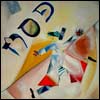Any place into which there is a possibility that chametz was brought must be searched. This includes rooms in which one normally does not bring food, for it is possible that chametz was brought into the room unintentionally. Thus, all the rooms of the house, even an attic or basement, must be searched, for it is not unlikely that one entered a room with food in his hand.
In the days preceding Passover, one should thoroughly clean all places where one is required to search. And on the night of the search, even though one knows that there is no chametz in a specific area, the place must still be searched.
Crevices high up on the walls of a room, or holes that are less than three handbreadths from the floor need not be searched. However, if these were once used, for any purpose whatsoever, one must search them for chametz. Similarly, in a house where there are small children, a person must search in the holes near the floor since it is not unlikely that the children placed something inside. One must also search on the tops of cabinets and cupboards if they are flat and sometimes used. One must search under the beds, in the cupboards, and in all household utensils, for it is possible that chametz found its way into these places.
One must search in his barn or chicken coops if he took chametz into them up to thirty days before Passover. Although it is possible that the animals may have already consumed the chametz, the possibility that the chametz might have been eaten does not outweigh the certainty that chametz was taken there. However, if no chametz was taken into the barn or coop during the thirty days before Passover, these places need not be searched, for two reasons:
1 any chametz which was there may have already been eaten, and
2 even if it was not consumed, it might have spoiled to the point where it is no longer considered to be fit for a dog (in which case it is no longer considered food).
If one discovers chametz while searching in his barn or coop and decides to feed it to his animals, he must stand there until they have finished it, to be sure that they do not drag it off to some other place. In such a case, the chametz might remain undiscovered and he would thus transgress the prohibition of having chametz in his possession on Passover.
Synagogues and houses of study must be searched. The sexton of the synagogue recites the blessing and conducts the search, but does not renounce ownership afterwards since he can neither nullify nor render ownerless something which is not his.
If chametz was buried under rubble: If the stones or dirt are more than three handbreadths high, the buried chametz need not be destroyed and nullification is sufficient. If there is only a small pile of stones atop the chametz, one must remove them and dispose of the chametz. If one has set aside a place in which he will store the chametz which he is selling to a non?Jew, that place need not be searched.
A person should carefully check his pockets as well as those of his children, for it is not uncommon to place food in one's pockets. This search should be conducted on the morning of the fourteenth, rather than on the previous evening, for it is possible that a person might inadvertently place chametz into his pockets again after the search.
Some authorities are of the opinion that one should check his pockets on the night of the fourteenth. At any rate, the procedure should be repeated the next morning ? for clothing which was worn after the search ? when he burns the chametz.
One should not use starch (which contains chametz) on one's garments within thirty days before Passover.
The obligation is to search for chametz, not to find it. Hence, if one conducted a thorough search and found nothing, he has fulfilled the mitzvah. Nevertheless, it is customary to hide pieces of chametz in various places around the house so that the person conducting the search will find them.
These pieces of chametz should be harp so that they do not crumble, or wrapped in paper or aluminum foil and should be placed out of the reach of small children who are to young to be careful, or of mice that might drag them away frog where they were placed. The person conducting the search should know how many pieces were hidden so that he can be sure that he has found them all. The Ari, Rabbi Yitzchak Luria, writes that one should hide ten pieces of chametz.
It is customary to use a feather or a small knife when conducting the search so as to be able to clean inside holes and crevices.






Start a Discussion